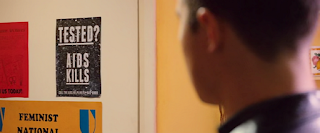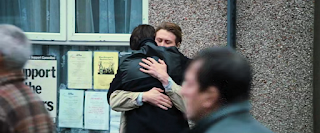Pride ⁞⁞ Queer Classics
Based on a true story, the 2014 award-winning UK drama Pride tells the story of a young group of gay activists who come together to help another oppressed minority, the National Union of Mineworkers, in the middle of a lengthy strike affecting coal in 1984. Taking place over the course of one year, the story begins at the Gay Pride march in London. Activist Mark Ashton (Ben Schnetzer) looks to gain more attention after hearing of the strike on television. Seeing a common enemy in Britain's political regime, he convinces his group of activist friends to join him in raising money for the striking miners. He's surrounded by fellow activists Mike Jackson (Joe Gilgun), and lone lesbian Steph Chambers (Faye Marsay). They hold many of their meetings in their local gay bookshop, owned by Welshman Gethin Roberts (Andrew Scott) and his longtime partner, Jonathan Blake (Dominic West), one of the first men to be diagnosed as HIV positive in the UK. At the same time, the young closeted Joe (George MacKay) is celebrating his 20th birthday. He sneaks away from his family to attend his first Pride event. Falling in with Mark's group by chance, Joe volunteers to help them in their fundraising mission, neglecting his university studies. Dubbing themselves the LGSM (Lesbians & Gays Support the Miners), they begin to gain steam.
With their effort seeing some success, they hit a major roadblock in that the national union does not intend to accept their funds because they are coming from an LGBT group. The team works around this by reaching out to individual striking minor groups, until one agrees to meet with them. After meeting Dai Donovan (Paddy Considine) who develops an immediate kinship with the group after they get him to thank the gay community for their support at a local drag bar, the LGSM descend upon the small Welsh village of Onllwyn, where they meet a welcoming group of older women, who have been on the sidelines supporting the men of their town who are on strike. They include homemaker Sian (Jessica Gunning), the outspoken Hefina (Imelda Staunton), and the shy poet Cliff (Bill Nighy).
After overcoming some immediate apprehension, the local town's committee agrees to accept the fundraising help of the LGSM after a rousing speech from Mark. With both groups coming together to help plan and execute a benefit concert that is highly successful, the villagers and the London gays build an even stronger bond. But their efforts are undermined by a homophobic widow, who gets the media involved, leading the union to vote on the issue, worried about added stigma for their cause.
Ultimately, the miners are defeated and return to work. But despite it all, the frustrated Mark finds his dedication restored, Gethin reunites with his mother, Joe finds the courage to escape his homophobic home life after being outed, and the older Welshman Cliff comes out and finds his place in both the Welsh village and the gay community. The LGSM are shocked when busloads of their new Welsh allies arrive at the next year's Gay Pride march to support their solidified alliance.
Queer Classic Film Facts:
- Stephen Beresford & David Livingstone won a coveted BAFTA in 2015 for Outstanding Debut by a British Writer, Director or Producer. Beresford wrote the film, while Livingstone was a producer.
- The film was nominated for seven British Independent Film Awards in 2014, winning three. Imelda Staunton won Best Supporting Actress, Andrew Scott won Best Supporting Actor, and the film won the top prize, Best British Independent Film.
- The film told the stories of many real people, including gay activist Mark Ashton, who died two years after the events of the film from HIV/AIDS at the age of 26 in 1987.
- Welsh homemaker Sian James enrolled in university after being inspired by her experiences depicted in the film. She would go on to become an elected member of Parliament in 2005, the first woman to ever serve the constituency of Swansea East. She served until 2015, the year after the film's release.
- Jonathan Blake was indeed the second person in the UK to ever be diagnosed as HIV positive. Now in his 70's, Blake continues to support LGBT causes, despite his diagnosis.
- Out actor Russell Tovey had a cameo in the film, appearing in one scene as Tim, a former lover of Mark's who he runs into at a club. Tim subtly reveals to Mark that he may have AIDS, as he warns him to take care of himself while calling his night out a farewell tour.
- The film featured cameos from several of the real life people who were involved with the events depicted. Mike Jackson, Reggie Blennerhassett (played in the film by Chris Overton), Ray Aller (played by the film by Joshua Hill), Gethin Roberts, and Roberts' mother Olwen Medi who portrayed herself, all appeared in non-speaking roles.
- Ben Schnetzer, who plays gay activist Mark Ashton in the film is actually American. Born in New York, Schnetzer moved to London in 2010 to attend drama school. While there, he was cast in Pride, displaying his mastery of the Northern Irish accent required for the part.
- The song "For a Friend," that plays over the closing credits, was performed by The Communards. The group wrote the song in honor of the real Mark Ashton, who was friends with members of the band.
- In one scene, Mark & Mike visit a record label, looking to secure an act for the film's fundraising concert. After they are turned away, Mark stops to write the number of the gay hotline on a wall, remarking that someone at the label might need it one day. In a fun nod, he writes the number below a poster of Elton John, who was not officially out at that time.







































































No comments